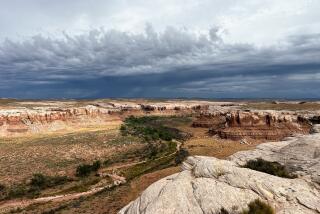Bush Moves In and the Music of the Trees Fades to Pianissimo
- Share via
Just over a century ago, the historian Frederick Jackson Turner described America’s dynamic in a word.
“Westering,” he called it.
Turner saw that the country was distinctively flavored, not just by the origins of its people, but by their encounters with the frontier, the land, the open space and the restless experience of migration.
Modern historians may fault the old Harvard professor and Huntington Library researcher as too Euro-white, too simplistic. But he was not wrong.
“We must feel it under our feet because we raised ourselves upon it,” philosopher Jose Ortega y Gasset said about the past.
Americans cut their teeth on the frontier--both the Americans we call native and those we do not. Our mythology walks from the shadows of the forest, through box canyons of the deserts, across prairie grasses, past tumbling streams and over wind-blown summits of purple mountains majesty. These are wellsprings where we draw measures of our self-image.
The story began in the West, back when the West was everything beyond Plymouth Rock. Actually, it began earlier but we have no record.
Today, the long-running tale is perilously close to the last chapter. Of all the vast wild West, shockingly little remains up for grabs. We argue over remnants of our legacy.
Barely 1% of our forests stand untouched and roadless in the lower 48--7% if you include Alaska--according to the World Resources Institute.
Naturally, argument over the forest gets more strident as the old trees vanish. Hungry people do not fight at a feast. Panic comes with the realization that there isn’t enough to satisfy everyone. Panic is now.
November’s election may have doomed the larger share of what has not already been divvied up from these mythic forests, never mind that the forests received little fair discussion in the campaign.
The self-proclaimed healer shows himself to be a Trojan Horse just as conservationists warned. Only a fanciful optimist can believe that George W. Bush will not somehow see to the reopening of 58.5 million acres of national forest that Bill Clinton finally set aside as roadless.
The cruelty: Protection can always be undone while development cannot.
Bush’s go-go profiteers have no mandate for this decision to suspend roadless protections on these public lands. His election was not the result of a wane in conservation sensibilities but a surge in them.
Have you hugged a Ralph Nader voter lately?
Clinton’s roadless designation was to take effect in March. Bush deferred implementation until May. Timber interests want to rush it even faster. Backed by the state of Idaho, they filed for an injunction against the Clinton protections in a federal court in Boise, Idaho--where judges are likely to share local prejudices, and where the reigning prejudice is to clear-cut and drill and mine and four-wheel-drive down to the last dollar.
Oral arguments were delivered Friday, and the judge promised a speedy decision. Perhaps the court will do Bush’s dirty work for him. Just bring on the bulldozers.
But this is not a matter for local choice. These 58.5 million acres belong not to Idaho or Boise Cascade but to us. Each American holds equal trust deed to these lands. That’s why they are called public.
Why not argue the fate of the forests before a jury in Los Angeles or New York? You know why.
True, not all Americans value their heritage equally. The music of the trees, said conservationist Aldo Leopold, is “by no means audible to all.” Doesn’t matter. Lots of good people hear it in their hearts. A majority of people, if counted by votes.
Clinton had the right to protect these lands. He was right to do it. As it stood, his decision was a compromise, and barely enough. His error was to wait until the end to strive for a legacy.
Bush won’t make that mistake. He’s jumping claim on his from the start. Call it, the end of Westering.
*
By the way: Whose idea was it to begin this column on April 1?
Mine.
April Fools’ Day arose, they say, when some numskull changed the calendar from Julian to Gregorian. Another numskull didn’t get the word and scheduled a New Year’s party for, oops, April 1.
Our annual commemoration lives on without commercial intrusion or official solemnity. It’s a day of high spirits, a time to dish it out.
Happy New Year.
*
This is the first of John Balzar’s Commentary columns, which will be featured Sundays, Wednesdays and Fridays.
More to Read
Sign up for Essential California
The most important California stories and recommendations in your inbox every morning.
You may occasionally receive promotional content from the Los Angeles Times.









